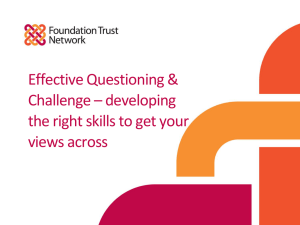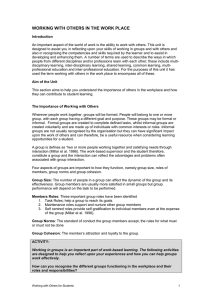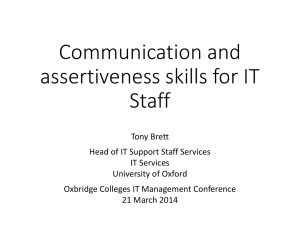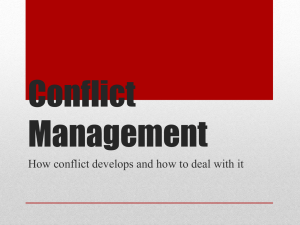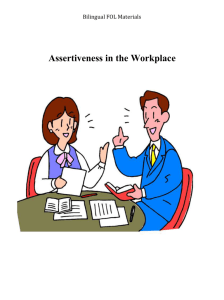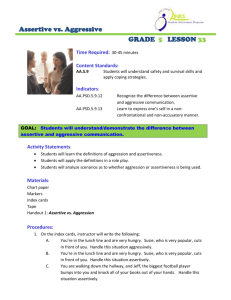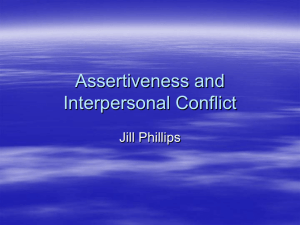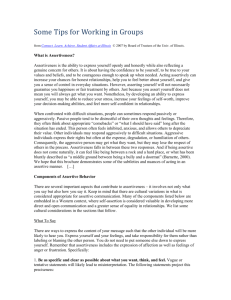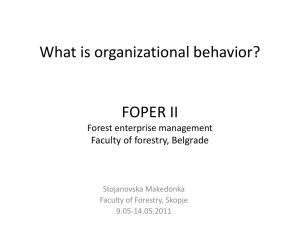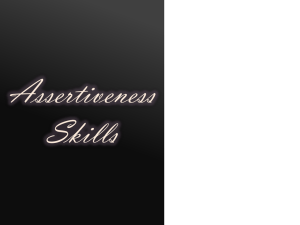as PPT
advertisement
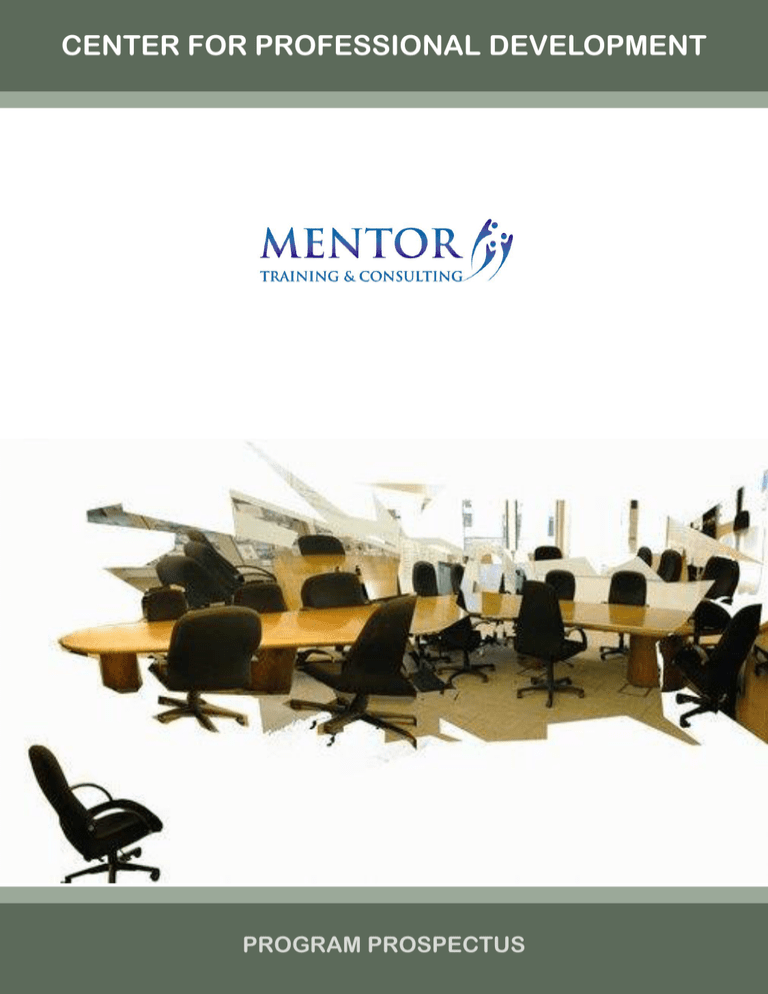
CENTER FOR PROFESSIONAL DEVELOPMENT PROGRAM PROSPECTUS Center for Professional Development Making Business Decisions Managing Workplace Stress Time and Priority Management Developing Assertiveness Skills Advanced Self Organization Skills Positive People Skills MAKING BUSINESS DECISIONS CENTER FOR PROFESSIONAL DEVELOPMENT Program Overview Decision making in contemporary organizations is characterized, more than ever before, by elements of risk, uncertainty, and ambiguity. Daily, leaders face time-pressured problems demanding responses that require critical analysis, creative generation of options, and the social intelligence to determine levels of inclusion and assess organizational barriers to implementation. Yet too many managers fall back on an unreliable combination of instinct, limited experience, and awed mental models to guide their decisions. This program directs participants to work from inside their own decision-making situations, applying a variety of means-formal, psychological, experiential, sociopolitical-to uncover their own strengths and limitations as decision makers, and to gain alternative strategies drawn from decision-making research. Throughout this program participants will learn to identify underlying issues related to a decision, generate multiple alternatives, evaluate those alternatives, and communicate and implement the decision. Return on Investment • Learn how to decipher the types of information that are vital to making decisions, and when to involve stakeholders • Identify your own preferred decision-making style and learn how to develop decision-making capability in individuals and teams you manage • Learn how to make smart, speedy decisions and how to determine when slowing down is crucial • Receive tools and techniques to assess the risks of making ineffective decisions and increase the likelihood of positive results-all while gaining the commitment of decision implementers • Determine a decision implementation plan for a real-work situation Who Should Attend? Managers and leaders who want to improve their ability to solve problems and make more effective decisions using tools and techniques that are flexible and easily applicable to today's complex business environment Program Focus What Is Decision Making? • Decision making as a process • Phase 1: Establishing a context for success • Phase 2: Assessing the situation and choosing a course of action • Phase 3: Communicating and implementing the decision Setting the Stage • Participants • Setting • Approach • Climate Recognizing Obstacles • Individual biases • Group dynamics Framing the Issue • Identify your decision-making objectives Generating Alternatives • Brainstorming • Encouraging productive dialogue • Promoting fair process Evaluating Alternatives • Variables to consider • Evaluation techniques Making the Decision • Moving toward closure • Ending deliberations Communicating the Decision Implementing the Decision • Assign reasonable tasks with sufficient resources • Clarify expectations and acknowledge incentives • Provide feedback on the implementation • Take a look for yourself • Recognize people's contributions MANAGING WORKPLACE STRESS Program Overview Stress in the workplace can never be completely eliminated – nor should it be. However, it can be managed so that you can function in a healthy and effective way. In this program, you will find practical, hands-on suggestions for managing workplace stress – from short-term “quick fixes” to long-term methods for changing the situation and/or your response to the situation. This program is designed to enable you to recognize the symptoms of stress and attune yourself to deal with it in a positive manner. Appropriate action can be taken, lessening the risk of the stress encroaching on general health and well-being. Return on Investment • Gain an understanding of what causes your stress • Recognize your stress symptoms and create strategies to diminish them • Learn to detect signs of stress in their early stages • Apply stress-management techniques to daily life • Learn how to stand up to stress and how to see it as an opportunity for personal growth and development and not a threat. Who Should Attend? This program is for anyone encountering pressure in the working environment and who would like to feel better equipped to handle it. This program is especially beneficial to people whose reactions to stress are negatively affecting their productivity, health, or interpersonal relationships and those who would like to achieve their goals while experiencing a greater sense of life balance Program Focus Overload and Toxic Worry • Why be concerned about stress? • The basic equation of worry • Negative stress cycle • Bad things really do happen Positive Stress and Productive Worry • The dynamic power of worry • The business value of wise worry • Different strokes for different folks Assessing Your Stress Level • Major work stressors • Changes in the workplace • Unhealthy work environment • Individual responses • Signs of dis-stress • Levels of stress Taking Charge: Strategies That Work • Reverse the Basic Equation of Worry • Take the four-step approach • Work-life balance The Rational Solution: Turning Worry into Action • Evaluate • Plan • Remediate The Connection Approach: Reversing the Basic Worry Equation • The disconnected workplace • Power of connectedness • Quick-fix connections • Self-Talk • The power of negative thoughts • Tune in to your self-talk CENTER FOR PROFESSIONAL DEVELOPMENT TIME AND PRIORITY MANAGEMENT CENTER FOR PROFESSIONAL DEVELOPMENT Program Overview If management is the art of getting the right things done, time management is perhaps the single most critical management skill. This program helps you learn how to prioritize your tasks – what to concentrate on, and for how long, as well as what to set aside. This practical program is for those who want to take more control of their workloads by organizing tasks, people, and themselves more effectively. Return on Investment • Recognize the value of effective time management to yourself, your team, and your organization • Clarify your own and your team's objectives, key areas of responsibility and priorities • Identify and overcome the primary causes of poor time management for yourself and your team • Identify time wasters and personal preferences that affect performance in the workplace • Prioritize your tasks and cope more effectively with day-to-day demands and pressures • Learn to plan ahead and use your time more effectively to increase personal and team productivity • Release more time to manage and delegate tasks effectively • Become more assertive and disciplined, achieving greater control through improved personal organization, resulting in a healthier, more productive lifestyle both at work and beyond. Who Should Attend? Managers, team leaders, and professionals who need to manage time more effectively to enhance their own performance and that of their team. Program Focus The Purpose of Managing Your Time • What is time management? • Phases of time management Understanding How You Spend Your Time • Where does your time go? • Finding the patterns Goals as Guideposts • Attempting too much Scheduling Your Time • Why do I need to schedule my time? • Tools for scheduling • Breaking goals into manageable tasks • Creating your schedule • Working with "to-do" lists Controlling Time Wasters • What is a time waster? • How to handle interruptions • How to handle unexpected visitors • Manage your phone \ • How to deal with paperwork • Fight procrastination • How to handle meetings • Make travel time productive Putting Your Schedule into Action • Implement your schedule • Monitor and evaluate your schedule Managing Others and Meetings • Managing people managers, colleagues, team members and customers • Getting more things done through assertive behavior • Making the most of meetings as participant or chairperson Effective Delegation • The rules of effective delegation • Using delegation as a means of coordinating the workload of your team/department DEVELOPING ASSERTIVENESS SKILLS Program Overview Assertiveness skills training can help manage difficult people and situations in an effective manner. Assertive rather than aggressive or submissive behavior can reduce the spiraling pressures and stresses that cause people to act and think negatively or under perform. This program examines the differences between assertive, non-assertive and aggressive behavior. Delegates will then practice assertive approaches to the many difficult situations they face mirroring real life scenarios. In a safe environment, role-play will introduce delegates to difficult, defensive or negative people who in various ways cause problems and conflict. With guidance and individual support, delegates will learn and implement proven techniques to deal with people effectively. Return on Investment • Understand why and how conflict arises and how to identify silent conflict • Recognize the non-verbal and verbal attributes of assertiveness and the benefits of its application in the workplace • Develop a style that is productive, positive and direct rather than aggressive or submissive • Give and receive feedback in a constructive and positive way • Recognize the link between assertiveness, confidence and self-esteem • Handle difficult situations and people confidently and assertively • Deal with criticism, confrontation, anger, and negativity effectively and positively • Overcome feelings of apprehension and understand the importance of language and body language to assertiveness • Develop techniques for better working relationships using assertiveness Who Should Attend? Members of an organization, regardless of role or function, who need time and space to examine, learn and practice positive and assertive techniques for working with others effectively. Program Focus Understanding Different Styles of Behavior • A definition of assertive behavior and the benefits it offers • Distinguishing between assertive, aggressive and passive behavior • Assertiveness at work - understanding human behavior Recognizing Your Own Style and Behaviors • Self-assessment of your style - the associated strengths and weaknesses • Cultural and gender based influences on your behavior • Building relationships with work colleagues Why do People Behave the Way They Do? • An introduction to the principles of Transactional Analysis • How are you perceived by others? • Avoiding the games people play Handling Difficult Situations, Problems and Conflicts • Tackling barriers to assertiveness - recognizing and dealing with fear and apprehension • Confronting common problems which occur in the workplace • Resolving conflict - dealing with difficult people • Raising sensitive issues Assertive, Persuasive and Positive Communication • Moving from negative to positive ways of thinking - building your self-esteem • Are you saying 'yes' when you should be saying 'no'? • The art of persuasion - getting ideas across • How self-esteem affects confidence and influences behavior - using assertive language • Identifying ways of building self-esteem and developing confidence Assertive Techniques • Taking control through positive body language • Using assertive and positive language - making your message clear • Giving and receiving critical feedback • Persuasion skills and coping with criticism • Applying assertive techniques in different workplace situations CENTER FOR PROFESSIONAL DEVELOPMENT ADVANCED SELF ORGANIZATION SKILLS CENTER FOR PROFESSIONAL DEVELOPMENT Program Overview The ability to organize is a skill not unlike the ability to supervise, delegate or use a computer. It can be learned, practiced and perfected. This program will show you how. During this program you will learn how to meet deadlines without overstretching yourself ... gain more control over paperwork ... and get more done in less time every day. After this program you will walk away with the skills you need to break time-wasting habits, bring order to your chaotic work schedule and reduce everyday stress. As a result, you will be able to claim more time for yourself and stay fully focused on key business tasks. Return on Investment • Break time-wasting habits • Bring order to a chaotic work life • Reduce everyday stress and frustrations • Claim more time for yourself • Enhance your professional image Who Should Attend? For business professionals who want to develop a more focused, organized, effective work style and reclaim the personal time lost to working overtime. Program Focus • The secret to remembering details • Basic organizational styles and how to maximize each • Are bad habits sabotaging your day? • How to keep your in-box under control • Types of lists that can safeguard your sanity • Do you cause your own confusion? How to determine if you do • How to remember things without covering your desk with sticky notes • Pinpointing your organizational weak spots • Work habits worth developing • Goal-setting - it's more than just a to-do list • The first step toward a more effective work style • The most common cause of disorder and how to overcome it • What to do when you feel other things are more important than cleaning off your desk • Recognizing and eliminating your tendency to be a perfectionist • Invaluable strategies for organizing your staff • Plotting the day's work: Determining what's urgent ... what can wait ... and what you can let go • Time-blocking - what it is and how it can help you get more done • Pieces of office equipment no manager should be without • Maintaining order when your job responsibilities continue to grow • A technique for keeping details pulled together on even the busiest days • Different ways managers defeat themselves when delegating work • Why downtime is important ... and how to build it into your schedule • The critical difference between a cluttered desk and one that's messy: How does yours measure up? POSITIVE PEOPLE SKILLS Program Overview This program helps you revitalize the relationships that determine the quality and profitability of your business. It goes beyond strategies for influencing the behavior of others to provide a process for creating clear communications, effective collaboration and relationships that achieve results. Interactive exercises wrapped around short lectures will introduce you to a series of frameworks for building new relationships and improving existing ones. As you focus on the cornerstones of successful relationships— knowing yourself, understanding others, developing trust and credibility—you’ll develop better listening and questioning skills. Return on Investment • Transform and revitalize key relationships with colleagues, customers, clients, and suppliers • Discover a set of alternative frameworks for building strong, ongoing relationships—across different functions, disciplines, roles, and cultures • Identify your preferred thinking style, and learn how it affects your interactions and results with others • Learn techniques for reframing situations that give you multiple perspectives and innovative solutions • Apply your insights to a current relationship challenge you face—and leave with workable solutions • Understand why different people act the way they do and handle all personality types with skill and ease • Communicate confidently, effectively, and tactfully with everyone • Eliminate self-sabotaging behaviors and build your circle of influence • Address differences diplomatically and quickly negotiate solutions Who Should Attend? Managers facing complex relationship challenges such as a merger or acquisition, a move into new markets with new customers, or a change in supply chain relationships benefit from this program. This program is also designed for individuals who would benefit from an enhanced ability to persuade and influence in the workplace. Program Focus Handle All Kinds of People with Tact and Skill • Recognize the "triggers" that set off difficult people • Actions that bring out the best in others in every situation • Understand how your attitudes toward people impact their behavior Build Consensus from Conflict • How to recognize when you are the problem • How to ensure both sides "win" and why it is so important • Take stock of different positions Say What you Mean to Get What you Want • The difference between passive, aggressive, and assertive behavior • Understand how anger affects a situation and how to manage it • Nonverbal communication skills that improve relationships every time Build Rapport with Practically Anybody • The difference between paying attention and really listening • Ways to interpret odd behavior • Why every great communicator is a great listener Directing and Motivating Others • Practicing steps for effectively giving directions • Knowing what motivates others to achieve high levels of performance • The basic principles of building and sustaining productive work relationships Being a Team Player: The Synergistic Impact of All Your Interpersonal Skills • Assessing your leadership role and guiding your team toward achieving goals • Team survival simulation: using interpersonal skills in a team process Setting a Plan for Continued Interpersonal Skills Growth • Developing an achievable interpersonal skills development plan CENTER FOR PROFESSIONAL DEVELOPMENT

